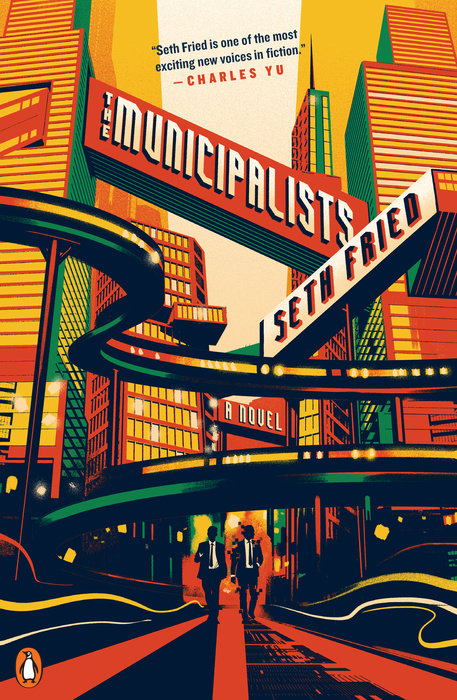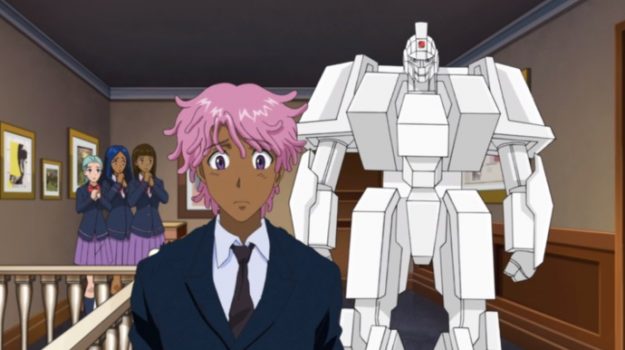
I’m burnt out on dystopia. We’re currently living through a number of different daily scenarios that George Orwell or William Gibson called decades ago, and new levels of absurdity that would make Albert Camus shake his head in disbelief. I don’t try to hide from the bad news, because it’s not like I could if I wanted to. But when I sit down to read a novel, I’d rather try and escape just a little. I’ve read plenty of books where some author shows us their version of what the future will look like, and nine times out of ten the prophecy is pretty grim—which is totally reasonable because, well, humanity likes to destroy itself. Still, I’d like a little less somber from time to time with my reading experience these days. Lately I try to steer clear of reading or watching anything about the future because, frankly, I’m sick of thinking about what’s to come.
One exception to that rule is Neo Yokio on Netflix. Created by Ezra Koenig of the band Vampire Weekend, the streaming series takes its animation cues from Japanese anime, but feels American because, well, it is a show about a great American city in some near-future scenario. Taking place in an undefined time in what was once New York City, in what appears to be some time after any number of disasters have befallen the planet, the premise of the show follows the uber-wealthy socialite and magician, Kaz Kaan (voiced by Jaden Smith) and his butler—the Jeeves to Kaz’s Wooster—Charles (voiced by Jude Law). Without getting into a full breakdown of the show, what appealed to me instantly, besides Koenig’s eye for style and the futuristic Wodehouseian undertones of the show, is its futuristic setting, something that Neo Yokio doesn’t concentrate too much on. What happened in the time between now and the futuristic time when the story takes place isn’t really something that’s given much thought, and that’s a big part of the appeal for me. It’s a bit whimsical, sure, but I personally find myself drawn to that. A little whimsey isn’t always such a bad thing, especially when villains are running the show in real life.
In general, I do enjoy plenty of weird, different takes on what the future might look like, it just has to give me something different, and right now it has to offer me some way of getting out of my Trump-era mindset even for a little while. Seth Fried gives us just that with his novel The Municipalists, which is equal parts Terry Gilliam’s Brazil, Blade Runner, and buddy comedy. Like the 1982 Eddie Murphy and Nick Nolte film 48 Hrs. got a modern day reworking just with a bunch of Philip K. Dick influence.

The city of Metropolis that Fried uses as his setting is either New York in the future, or it’s some pastiche à la Gotham City or the city of the same name that Superman lives in. Unlike other near-future scenarios Fried doesn’t bombard us with signs that a quarter of humanity was wiped out by some deadly plague or one country dropped a bomb on another. The Municipalists is a crime caper set in the future, but it isn’t a dystopia, and I appreciate it for that. The world Fried paints is easily recognizable as one that might not be too far away, one where AI is a regular part of humanity’s day-to-day lives.
Of course, the future is still weird. Henry Thompson, who works for the United States Municipal Survey, a man obsessed with city design and also obsessed with details, is paired off with OWEN, a brilliant hologram hooked up to a supercomputer. Henry loves his job. We find out early on it’s a replacement for a tragedy he suffered as a young boy. “I have always loved the United States Municipal Survey. Not just the work. All of it. I love my small office on the fifth floor that gets so cold in winter I have to wear an overcoat while I fill out paperwork.” He goes on to talk about all the things he loves, while we find out that, at least among his colleagues, the feeling is not mutual when it comes to Henry. He is a play by the rules, no fun type, and not very well-liked by the other people he works with.
Henry and OWEN set off to solve a mystery together, and what sets this book apart from so many recent novels set in the future is that it’s a hilarious crime novel, but one that feels almost as if it takes place not too far down the road from Gary Shteyngart’s Super Sad True Love Story; Fried and Shteyngart both share a somewhat similar sense of humor. Sure, there are hints of sci-fi and noir, but Fried never depends too much on the tropes from any one genre. His story goes down one very familiar path where you have the story of some Type A employee of a government agency who falls into a mystery. He’s teamed up with a partner who has some screws (or in OWEN’s case, maybe some megabytes? I don’t know) loose, some hijinks ensue, but things work out one way or another. It sounds like something you’ve read or watched before—every generation has its Dragnet—but Fried offers something different, that is, The Municipalists is not one kind of book, it’s not noir or sci-fi or literary fiction, but all of those things meshed together. It’s an entertaining and original story that may have started with one of those genres in mind, but grew into something else.
Like Neo Yokio, Fried’s novel works because it lures the reader in with the promise of a near-future cyber noir type deal, but gives us something with more heart and humor. As chatter grows about the rise of artificial intelligence, we watch AMOS go from a robotic standoffish smartass who literally knows just about everything there is to know (he can wind down by reading 10,000 books if he’d like), to something that starts understanding human feelings it might not have computed before, from flinching at the sight of an injury Henry sustains to apologizing for being glib about his partner’s parents’ death when he was just a boy. Shouldn’t we be worried about a robot gaining emotions? Isn’t that a bad thing? Fried doesn’t dwell on that; OWEN’s growth is part of the story and not so much a commentary on the possibly war between man vs. machine or something like that.
While some of the characters or themes might read like something you’ve seen in a book or film, The Municipalists is really a fresh and funny take on the near-future crime novel. And in these dystopian times we’re living through, I’d take fresh and funny over an added dose of doom and gloom on top of the hearty serving we eat every single day. I’m terrified of the future, but Fried makes it a little more entertaining.
***
The Municipalists
by Seth Fried
Penguin Books; 272 p.
Follow Vol. 1 Brooklyn on Twitter, Facebook, and sign up for our mailing list.
